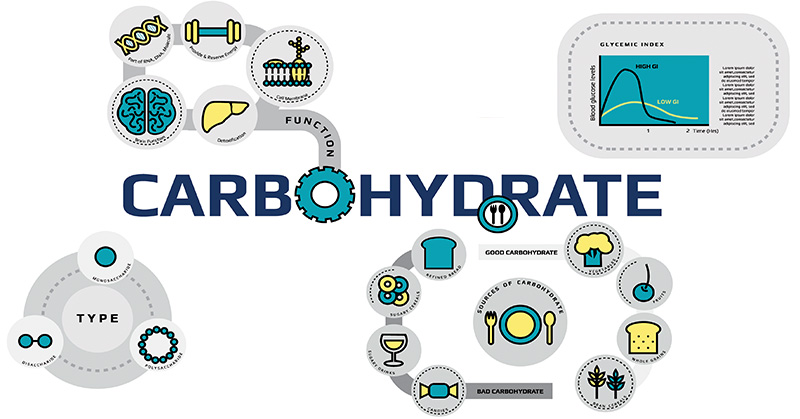- Simple carbohydrates e.g. sugar, honey, corn syrup. These consist of 1 or 2 sugar units.
- Complex carbohydrates e.g. vegetables, whole grain seeds, potatoes. These consist of 10 to several thousand sugar units.

Fun Fact: Excess complex carb consumption is actually worse for those wanting to minimise weight gain than excess fat consumption.
This is because storing 300 calories of carbs burns 30 calories to turn the carbohydrates into fat for storage, meaning 270 of the 300 calories consumed are stored as fat.
Although this doesn’t mean you should avoid fats, as they have their place and the ACSM recommend
they make up 20-35% of an active person’s diet.
However, not all simple carbs are digested quickly and some complex (slow digesting) carbs such as potatoes are actually digested faster than apples (a fast digesting carbohydrate) causing a more rapid rise in your blood sugar levels.
This makes the GI index safer to use- especially for diabetics. Low GI foods include but are not limited to; sweet potatoes, porridge, eggs and fish. A high glycaemic diet (one high in sweets etc) puts you more at risk of type two diabetes and heart disease.
Brand-Miller et al (2005) and Warren et al (2003) found a low GI diet increases feelings of fullness after eating, improves appetite control and makes it easier to
achieve a healthy body weight.
How many carbohydrates do I need?
If you train for less than an hour per day: 3-5g per kg of body weight per day. If you train for 1-2 hours daily: 5-7g per kg of body weight per day.
If you train for 1-3 hours daily: 7-12 per kg of body weight per day.
If you train for more than 4 hours daily: 10-12g per kg of body weight per day.

Do low carb diets work?
A low carb diet causes a glycogen depleted state, this makes athletes (and general gym goers) choose a lighter weight or a lower intensity exercise as workouts feel more intense.
This makes achieving goals of muscular strength or hypertrophy (growth) much harder to meet as the stimulus being placed on the muscles is lower.
‘But so and so lost X amount of weight in X days on this low carb diet!’ Yes, they did, but do you know why?
The body stores 3g of water with every 1g of carbs, this means lots of weight is lost in the first few days however this weight is WATER and will not give you the appearance of a lower body fat percentage.
Plus, low carb diets are unsustainable and as consistency is key for physique changes, you will find the weight does not stay off…

When is the best time to take carbs?
- 1-4 hours before exercise: 1-4g carbs per kg body weight.
- Immediately after exercise: 1-1.5g carbs per kg body weight, repeat every two hours for six hours.
How fast can my body digest carbohydrates?
Your body can digest 60g carbs (240 calories of carbs) per hour of exercise,
although later research shows this can be as much as 90g during intense exercise!
Applying this to your diet
- Choose carbohydrates sources that are lower on the GI index (defined as under 55).
- Consume 1-4g carbs per kg body weight 1-4 hours before training.
- Consume 1-1.5g carbs immediately after exercise and repeat every two hours for six hours.



